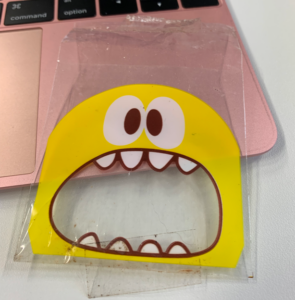09-50-M1-T2: Tutorium 2 zu „Einführung in die Ethnologie“ | Tutor: Ben Baumgarten | WiSe 2023 |6297282| Xiying Huang | Freitext
This is a small plastic transparent packaging bag, which is a 6 cm square, with a cute cartoon image of a yellow jelly bean. Let me name it Yellow Bean. Mr. Bean opens his mouth wide, showing eight teeth, as if he is going to swallow something. Obviously Mr. Bean has been used by his owner for several times. The adhesive strip on his back is almost non-sticky and is covered with dust and dirt. Two small pieces of transparent tape are both on the upper and lower sides of Mr. Bean, with still some white powder left on them, which seems to indicate that he was once fixed on the wall for decoration. His mouth is the best home for candy, chocolate, cookies, earrings or ornaments. Mr. Bean, or plastic bag, is an old friend to humans. There is a long story about his family.
In 1933, a chemical factory in England accidentally develops the most commonly used plastic – polyethylene, and it was the first time this compound had been synthesised into an industrially material. 32 years later, an engineer Sten Gustav Thulin designed the one-piece shopping bag and it was patented by the Swedish company Celloplast. The plastic bag quickly replaced cloth and paper bags in Europe. In 1979, plastic bags, which have successfully occupied 80% of the bag market, have been used across the world and especially in the United States. Companies that produce plastic bags have begun widely marketing their products, exaggerating the advantages of plastic bags over paper bags. From 1982, more and more stores switched to plastic bags, following the two major supermarket, Safeway and Kroger, and within just 10 years, plastic bags almost completely replaced paper bags and dominated the world of shopping bags. However, in 1997, Charles Moore, a navigator and researcher, discovered the Pacific Garbage Patch – Ocean circulation will accumulate a large amount of plastic garbage, which seriously threatens the survival of marine life. For example, plastic bags have killed large numbers of sea turtles who eat them by mistake. Therefore, since 2000, more and more countries have introduced “Plastic Bans”, implemented strict regulations on the use of plastic bags, and charged high taxes to protect the environment. Today, plastic bags have become a global environmental issue. On the one hand, humans have yet to find synthetics or any other materials to totally replace plastic. The advantages of plastic are obvious, such as being thin, stretchable, light-transmitting, water- and oil-proof, low-cost and durable. People cannot live without plastic and plastic bags. On the other hand, plastic bags cannot be degraded naturally and will cause serious pollution after being discarded. The protection of animals and the ecological environment is urgent to human beings.

“Wait! This is not my fault!” Mr. Bean suddenly talks to me.
“I’m born to be your best friend! I can help you to keep food clean.”
I am shocked, but he continues talking.
“But humans don’t want to be my friend forever, they use me only once or twice, then I’m abandoned. What can I do? No one is perfect! All my wish is just living a long life.”
That is true. We enjoy the convenience plastic bags bring us, but seldom consider their fate after being used.
“Hey, are you listening?”
“Yes, yes… I’m sorry for not thinking of your feelings before.”
“Well, it’s not late. Thank you for picking me out of so many stuffs. Thank you for choosing me out of my buddies. Maybe I’m the least valuable of them all. A gust of wind can blow me away…”
“No! You are so worthy! Even though you are the lightest and cheapest one among your buddies, you can do so many things they can’t. You are not afraid of dirt, water, and oil, you are so convenient to carry. You can protect all my little treasures like a soldier. And you are so cute that I knew I liked you the first time I saw you. Would you like to keep my ring in your big mouth?”
“No problem! But if one day you don’t need me anymore, remember to send me back to my brothers and sisters! I don’t want to be left in the nature and stay alone for hundreds of years…”
Mr. Bean eats my ring and runs into my bag. “Nice ring, but tastes bad.” He adds.
I am so glad to meet Mr. Bean. Even seemingly weak one has tremendous power to change the world. Just like our habit of reusing and recycling plastic bags. People and plastic are not in a hostile relationship. What we need to do is help each other. After getting help from plastic, it is our duty to help them return to their place of birth and realise their own value. Thank you to the plastic bags for their nearly a century of service to mankind. They are not demons, just misplaced. They are not trash; they are misplaced treasures. How to rationally use plastics and protect the environment is an issue of human. I know there will be one day, technology can help plastic bags coexist harmoniously with the environment.